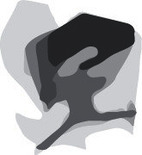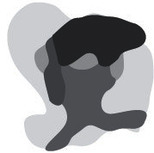War of the Encyclopaedists (38 page)
Read War of the Encyclopaedists Online
Authors: Christopher Robinson

The problem here was that given P or âP, and hence B or âB, he was arriving at both H and âH. Therefore, by reductio ad absurdum, he ought to infer âP. That meant he didn't even need to buy a test. By the law of noncontradiction, there was logically no way that Mani was pregnant. The only scenario for which he could imagine a definitive H value was if Pregnant was false and Birth true, which made sense only when you were talking about Mary mother of God, the virgin birth, the virgin abortion. Corderoy's head hurt.
He chose the standard nondigital Clearblue test. He pretended to be checking a text message as the cashier rang him up.
â¢Â â¢Â â¢
“Well, what does it say?” Corderoy asked through the door.
Mani often peed with the door open, knowing Corderoy wouldn't care. But this wasn't just peeing. It was peeing with additional hardware, and she'd opted for privacy. “I don't know,” she said. “It's like half a line or something.”
“Pee on it more.”
“I'm out of pee,” Mani said.
“You're just not forcing it out,” Corderoy said. A minute passed. Corderoy heard some tinkling. “Mani?” Another minute.
The door opened. She held the plastic strip up, her face expressionless. There was a big plus sign in the test window. “I'll just get rid of it,” she said.
“Whoa. Okay. Have you done that before?”
“What? No!”
“Sorry.”
“That's the best thing to do, right?”
“Definitely.”
And it went on like that for a half an hour. Mani sitting in bed, her legs tucked into her arms, Corderoy sitting on the edge of the bed. He didn't have to convince her. She had convinced herself, but for some reason, they both felt compelled to reiterate what a correct decision it was, how obviously right they were to make it, how it was not only the best choice but the only choice, right? Right, of course. Do you even have to ask?
48
Mani spent the next week not painting and not smoking cigarettes and not drinking and not smoking weed and not calling Planned Parenthood. Corderoy left for “school” during the days, so she had prodigious blocks of time in which to do nothing. She couldn't even watch TV. She could only think about what she wasn't doing. The many things she wasn't doing. Which included writing a letter to her Wartime Husband. She could do that. She should.
It was an incredible feat of will to climb out of bed and grab a sheet of paper and a pen, but once she had written
Dear Mickey
at the top of the page, the words came freely.
Dear Mickey,
I suddenly find myself with child. I never understood that phrase until now. It's so honest and blameless, that “with.” It's not heavy like “pregnant” or crass like “knocked up.” It has none of the hand-Âwringing denial of “I'm three weeks late.” Late for what? “With child.” It has weight without judgment. It's a soft and full acknowledgment of fact.
You know who the father is. I make myself say that to remember gravity. It's so easy to go walking on the moon when you have life-altering decisions to make on earth. And there's really only one option. Right? The pros of doing it are great, the cons of not doing it are enormous. I'm sure at some point you gave some girl the speech that all boys think we've never heard before, the speech we
start giving ourselves in our own headsâon continuous loopâthe moment we find out.
I don't know exactly why I'm writing you, Wartime Husband, except that it seems like a thing you should know. I'm not asking for advice. The whole thing will be over by the time you even get this letter. And so it seems a little fucked up to send it to you. I don't want to freak you out or give you extra things to worry about. Maybe writing to you is like flipping a coin. That always helps me make decisions. Not because it tells me what to do, taking away the burden of thinking it through, but because it helps me figure out how I really feel once some outside force pressures me to act one way or another. So, I'm going to the clinic soon. Can you imagine what it feels like to write those words to you right now? I hope you can. I hope you're safe. Thanks for being my coin.
xoxo
mani
Less than a day after sending the letter, things began to crystallize inside her psyche, and not in the way she had expected. She began to imagine ways it could all work out. Hal's parents had some money. So did her own. They could help. Who knew what artistic and personal wisdoms she would gain from bringing a life into the world? There would still be time to paint. With babysitters.
Baby
. She said that word and it sounded so warm, so vulnerable and worth protecting. She remembered that moment in the hospital, her need for morphine, her fear of what it might harm. Baby. A small portrait of herself and Hal together. She was confused and excited about her confusion, and it was overheating her. For the first time in days, she needed to move, to really move.
It was the last day of February and the air was cold and empty of life. The people on the street shambled like animatronic piles of scarves and gloves and coats. Mani cruised past them on her bicycle, wearing only a light jacket, unzipped, letting the violent air caress her. She had been angry that her own biology could trap her in such a way, limiting her future options. She had wanted to rebel against that. But now she was beginning to feel that it was her culture, her friends, her family, her ambitions that were limiting her future options. Raising a
child would give her energy, it would redefine time, it would become her art. And wouldn't that be the true act of rebellion, to say:
Fuck it! I know it's not practical, I know the world doesn't need another ego, but I'm doing it anyway. And I will love that thing and the person it will become and it will make me an immeasurably wiser, kinder, better human.
A baby was, perhaps, the biggest opportunity she would ever have. How could she so easily pass it up?
Her fingers felt like brittle and useless twigs as she tried to lock her bike up to a pole on Brighton Avenue, across the street from her loft. When she stood up, she breathed hot air onto her fingers and found herself staring into the window of the local dive bar, the Silhouette Lounge. And there, past the Sam Adams sign and the Bruins logo, there was Hal, playing Big Buck Hunter. She went inside.
He had just finished his game and he plopped down at a table, seemingly unaware that Mani was standing ten feet away. He had a tallboy PBR in his hand and several empties on the table. It was five p.m.
“Hello?” Mani said.
“Hey!” Corderoy exclaimed. “You want a drink?”
“What are you doing here?” Mani asked. “I thought you didn't get out of class until five-thirty.” She noticed that he had a bandage in the crook of his left elbow. He looked pale. “Did you give blood or something?”
“Plasma. What are you having? I'm buying.”
“We need to talk.”
“Let's talk.”
Mani looked around the bar. It wasn't a dive so much as a wreck. There were a few sullen construction-worker types at the bar top. Some hipsters playing pool, darts. Megadeth was on just loud enough to be annoying. “No,” she said. “Let's go back to the apartment.”
“I'm half-full here,” Corderoy said, taking a swig of beer.
Mani gave a weary grunt, then sat down across from him. She took a moment to compose herself. “I've been thinking a lot about this,” she said.
“About what?”
She stared at him, unblinking.
“When is the appointment?”
“I didn't make it yet.”
“What?”
“I will. I just want to be sure. Consider every option.”
“We did that already.”
“My parents have some money. So do yours, right? And I have money from the Army, through Mickey. It would be tough, but I think we could do it.”
“I don't want Mickey's money,” Corderoy said. “And my parents are broke. And you know what it would do to our lives. You think you'll have time to paint?”
“We could figure out sitters or something.”
“You think I'll have time to study once I go back?”
“Go back where?”
“I mean.” Corderoy chugged the rest of his PBR. “I dropped out,” he said.
“What?”
“But I'm gonna go back. I just need to earn some moneyâmy parents can't help with tuition anymore.”
“What the fuck! Where do you go every day?”
Corderoy looked down at the bandage on his arm. “I've been doing medical studies.”
“That's your plan?”
“Well, it sucks to be stuck with needles and shit, and the pay is inconsistent, but I could make three hundred dollars a week as a sperm donor. I'm waiting to hear back about my sample.”
“What is wrong with you?”
Corderoy looked like a teenager called on unexpectedly in English class. “Nothing . . . I hope?”
“You didn't think that was something you should tell me?”
“I didn't thinkâ”
“Yeah, you didn't think.” Mani swiped his empty cans off the table and left. Corderoy stood to follow her but stopped himself and thudded back into his seat. There was a way to fix all this. There had to be, he just had to think harder, a lot harder, and maybe drink a few more beers.
â¢Â â¢Â â¢
Corderoy stumbled in an hour later after taking a brisk and coatless walk down to the Charles. Mani was standing in the middle of
the room, facing the door, like a villain in an action movie.
I've been expecting you. Prepare to die.
“Maybe it would be,” Corderoy said. “Good, to have it.”
Her face softened. “What makes you say that?”
“Sometimes you just have to jump in the river with your clothes on,” he said.
Mani cocked her head at him.
“You know, when you don't know what to do. You might as well go big, do something drastic. At least it will be exciting.”
“And then what. Raise it? Adoption?”
Corderoy shrugged. “Do we have to figure that part out now?”
“I should call,” she said. “I'm calling.”
“Sit down,” Corderoy said. And he went over to her bed and patted the mattress next to him. She slumped over and joined him.
“Is that what you want?” he said.
“Fuck,” she said softly, lying back on the bed.
“Fuck,” he said, lying down next to her.
“How can you know?” she said.
“Me?”
“Not you, the general you.”
“So, you.”
“Yes. Me. How can I know if I want to go through with it until I'm going through with it?”
“You can't, I guess.”
Mani sighed.
“But you can always walk out.”
“Can I?”
“Why not? Talk to the doctor, see how comfortable you are in that room. And if you're in that chair or whatever and you want to leave, just get up and walk out.”
“I can't figure out which choice is more exciting,” she said.
“Maybe that means you're lucky?”
49
The waiting room at the Planned Parenthood had light blue walls, blue chairs, blue Kleenex boxes. Mani squeezed Corderoy's hand, hard and rhythmically. Across the room from them were two other women, sitting several seats apart. One looked like a middle-aged career woman in her dressy pantsuit. The other was a teenager who looked bored. Corderoy thought that perhaps it was a defense mechanism, an unwillingness to face the fear and uncertainty of what this room represented.
“Are you okay?” he whispered. “Do you need some water or anything?”
Mani squeezed his hand again. “I'm okay,” she said.
A door opened and a woman said, “Ms. Saheli?”
Mani stood, still holding Corderoy's hand.
“I'll be right here,” he said. “Just get up and walk out if you need to.”
Mani nodded and followed the woman in back.
There was a rack of pamphlets on the end table, and Corderoy plucked out the one that said,
Thinking about getting a vasectomy?
Apparently he could get one for as little as three hundred dollars. The amount he'd be paid for a donation at the sperm bank. The awkwardness of the donation process had faded in the last week, and Corderoy had found himself getting strangely excited about being a donor. This was due largely to the fact that his waking and his sleeping thoughts had been sucked into the vortex of Mani's pregnancy, and perhaps partially because, for a sense of balance, one act of destruction suggested an act of creation. And here he was, waiting for Mani to
emerge unburdened. So why not donate? He wasn't perfect, but he had desirable traits. He was even wearing a clean shirt today. They could analyze his handwriting all they wanted; he had nothing to hide. He hadn't understood earlier why they called it a donation if you were getting paid, but it was clear to him nowâit was an act of charity, potentially helping some infertile couple to conceive. It felt good.
The door swung open and the older woman was called in; he had an odd feeling of envy, like he was sitting in coach near enough to first class to catch a glimpse of their luxury when the flight attendant passed through the curtain. Of course, it wasn't luxury behind that door. Or if it was, it was the luxury of being burdened with weighty moral decisions. He had nothing important to decide. There was nothing he could do that would damn him, nothing that would bless him.
â¢Â â¢Â â¢
Mani was led to a small room where she was instructed to remove her clothing and put on a paper slit-backed robe. She felt embarrassed getting naked under the fluorescent light, so she did it quickly, then climbed up on the examination table, feeling her thighs stick to the parchment paper. And she waited. She counted out a minute. Another. She reached for a pamphlet on the counter next to the table and flipped through it. It was a description of the vacuum aspiration procedure.
Once the cervix has been numbed and dilated, a sterile cannula is inserted into the uterus and attached to an electric pump. The pump creates a vacuum which empties the uterine contents.
After the procedure, the tissue removed is examined. Expected contents include the embryo or fetus as well as the decidua, chorionic villi, amniotic fluid, amniotic membrane, and other tissue.

There was a clinical diagram of the cannula being inserted into the uterus. Mani was fixating on it when a woman walked in.
“Hi. I'm Vanessa. I'm the head clinician here.” She was in her late thirties. Her dark brown hair was pulled back in a ponytail, and she wore tortoiseshell glasses. She was on the heavier side, with a roundish face. Mani thought she looked like someone who could bake a great pie.
“You've read through the pamphlet, I see,” the clinician said. “Any questions?”
Mani shook her head. Get up and walk out?
“Are you sure?”
Yes, she was sure. She had no questions. “Will it hurt?” she asked.
“There will likely be some uterine cramping,” the clinician said. “But no worse than typical menstrual cramps. We'll apply a local anesthetic to your cervix, so there won't be any direct pain from contact with the speculum or dilators.”
“How long does it take?”
“No more than fifteen minutes. But we ask you to wait in our recovery area for a while afterward.”
Get up and walk out?
“Are you ready to begin?”
Mani nodded.
“Okay, lean back on the table and put your legs in the stirrups.”
Mani lay back and stared at the perforated ceiling while the clinician took the metal speculum and ran it under warm water to heat it up. She tried to conjure the diagram from the pamphlet, but it had become an abstract jumble of colors in her mind.

The clinician turned the water off and began applying grease to the speculum. Get up and walk out? Mani felt the metal slip into her, widen her.
“I'm applying the anesthetic now,” the clinician said. Get up.
“Okay,” Mani said. And something snaked its way into her, past the metal clamps, and stabbed at her soft and untouched inside, piercing until it began tingling outward. Walk out of here.

She was no longer seeing the diagramâit had become a flower, or a dancer, or an explosion. Get up and walk out.
“We'll give that a minute to take effect,” the clinician said.

“I'm going to dilate your cervix now,” the clinician said. “You'll feel this a bit, but it shouldn't hurt.” Walk out.

“Halfway there,” the clinician said. “All we have to do nowâ”
“I don't need to know everything,” Mani said. I'm getting up and walking out. Okay?
“Okay, just let me know if you have any concerns.”
And then something hooked its way to her hollow.

Her hollow, which was a mushroom cloud. The pump wheezed to life and Mani got up and walked out as the vacuum collapsed her dimensions, drawing everything in, her center buckling with cramps, a system-wide dry-heaving that moved up through her chest and into her head, where her consciousness imploded.

But she was fine, for she had gotten up and walked out. She wasn't even here. She was nowhere. There was a black tear in the fabric of the universe and she had slipped through it to a place of uncompromising silence.

“All done,” the clinician said.
